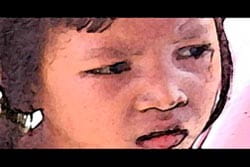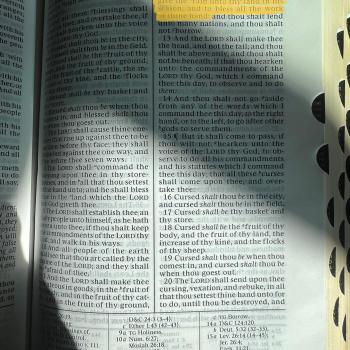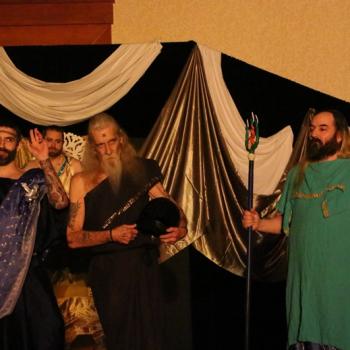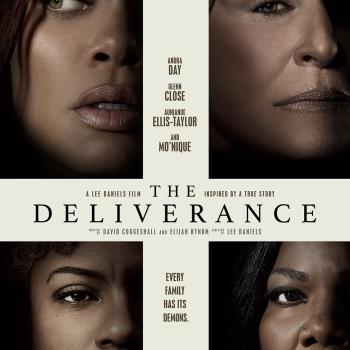By Mark D. Roberts
 In Part Seven, I began considering what in Stave 3 contributes to the transformation of Ebenezer Scrooge's heart. I summarized the events of Stave 3, focusing especially on Scrooge's response to children in need: Tiny Tim of the Cratchit family and the two wretched children who hide under the robe of the Ghost of Christmas Present. Let me offer some conclusions and reflections on the events of Stave 3.
In Part Seven, I began considering what in Stave 3 contributes to the transformation of Ebenezer Scrooge's heart. I summarized the events of Stave 3, focusing especially on Scrooge's response to children in need: Tiny Tim of the Cratchit family and the two wretched children who hide under the robe of the Ghost of Christmas Present. Let me offer some conclusions and reflections on the events of Stave 3.
What in this stave contributes to the transformation of Scrooge's heart? Partly, it's the observation of Christmas celebrations, especially those of common folk, especially the poor, who, in spite of their material circumstances, enjoy the jovial spirit of Christmas. Yet even more powerful than this observation is Scrooge's vision of Tiny Tim and his suffering. Like Dickens, Scrooge finds himself moved by the plight of a child in need.
Yet the Spirit of Christmas Present doesn't merely allow Scrooge's heart to be touched by childhood pain. He also confronts Scrooge twice with his own words of scorn for the poor. In response to the first of these, Scrooge repents with much sadness. We don't know of how he responds to the second confrontation, however, because the Ghost of Christmas Yet to Come makes his appearance before Dickens can relate Scrooge's feelings.
Pastoral Reflections
Sometimes I think Dickens overstates the power of celebration to thaw Scrooge's heart. Yet I have seen this sort of thing happen. For example, perhaps the strangest worship service in my church each year occurs on the Sunday following our Vacation Bible School week. In our otherwise ordinary Sunday services, worship leaders dress in costume and lead children's songs with lots of hand motions. The children are exuberant in their worship, and predictably wiggly and noisy during times of prayer and scripture reading. The "sermon" is a dramatic sketch in which I and a couple of my colleagues are dressed up as wacky characters who inevitably discover the truth of the gospel in spite of our silliness. Children love VBS Sunday. But what about the grown-ups?
When we first did VBS Sunday this way, I was afraid that some of our more sedate and refined adults would be upset. Was I ever wrong! They loved it just as much as the children, in some ways even more. There was something about the unsophisticated celebrations of children that allowed even very grown up people to rejoice, sometimes even clapping their hands or joining the children in their hand motions. So, given the right circumstances, I do think that celebration, especially that of children, can be contagious.
But I also agree with Dickens that the suffering of children, perhaps even more than their celebration, can open hearts in a unique way. Consider, for example, the case of African children orphaned because of AIDS. Their tragedy has touched the hearts of millions, even people who might have been reticent to care about the HIV/AIDS crisis because of its association with sexual immorality.
Moreover, World Vision and other charitable organizations have found that people will give generously to help hungry children even when they might be less inclined to help equally hungry adults. If you go to World Vision's Ways to Give page, you'll find pictures of struggling children, along with ways to contribute to their well-being. But you won't find any pictures of adults in similar distress. This is not an accident. Partly it reflects World Vision's laudable focus on children. And, I expect, it also reflects a realistic judgment of what moves people to give. I'm not criticizing World Vision for this, please understand. In fact, my family and I regularly contribute to World Vision. If you are looking for a place to make a special year-end gift, I can think of no better one.
Dickens is right to realize that compassion alone won't change people's hearts, however. The Ghost of Christmas Present rightly confronts Scrooge with his own hard-heartedness, that which Christians call sin. Scrooge needs, not just an infusion of kindness, but a complete change of heart. And this requires repentance and reformation.
Once again I see Dickens's understanding of human nature to be much in accord with Christian anthropology. Christians believe that the transformation of human beings requires repentance. In fact, we believe that a Spirit, in this case, the Holy Spirit of God, brings conviction of sin so that we might turn to God (see John 16:7-11).




